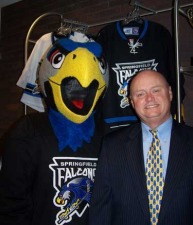Falcons Arise

Bruce Landon keeps professional hockey alive in Springfield
By Katelyn Gendron-List
For professional athletes, the thought of injury or having to give up the game at the end of their careers is something seldom talked about; every second of their lives is dedicated to the game.
When Bruce Landon suffered a knee injury in 1977 after eight years as a professional hockey player, he was forced to face that reality and retire at 28 years old. But that didn't diminish his love for the game or deter Landon from continuing his involvement in professional hockey.
Staying in the game
Knowing little to nothing about the business aspects of running a professional sports franchise, Landon became the director of Marketing and Sales for the Springfield Indians hockey club. Now, 30 years later, the 2007-08 Springfield Falcons hockey season will mark Landon's 24th season as general manager and his 14th season as president.
"I was literally given a pencil and paper and they said, 'now you are in charge of Group Sales'," Landon said. "I really didn't know what that meant but I was able to make it work."
At the conclusion of the 1993-94 season, and his twelfth year as general manager, it became apparent that Springfield would be losing its professional hockey club. Two weeks later Landon formed an investment group with a former teammate to buy an expansion franchise.
"TV 22 put a microphone in front of my face in the last game of the '93-94 season and asked me what I was going to do," Landon recalled. "I said I'd like to keep hockey alive in Springfield cause it would be a shame if we lost it." This season marks another turning point for Landon and his business model as the Springfield Falcons welcome their new National Hockey League (NHL) affiliate, the Edmonton Oilers to the MassMutual Center.
From ticket sales to corporate sponsorships Landon is modifying his business model to try to create greater stability in an environment where an independent owner has little control of the on-ice product, a responsibility that is retained by the NHL parent club.
"It's amazing that the primary factors that affect your revenues are really things that you don't control that much," Landon said. "For the most part Edmonton is really in charge of putting that product on the ice and they need to come up with a quality team for us because without it, it will affect our revenues. We feel with a better, competitive team our revenue streams will grow as well."
His strategy for success
Because Landon is unable to control player injuries, call-ups, trades or the overall winning record of the team, he stated that his main focus this summer has been, as always, on the business aspects of the hockey club.
The Falcons franchise, as independent owners, pay a hefty affiliation fee to their NHL partner every year which includes the players, coaches and medical trainer. However, the costs of operating the franchise are left up to this American Hockey League (AHL) franchise. Revenue streams that are controlled by the Falcons include ticket sales, corporate sponsorships, dasher boards, concessions and merchandise.
With a corporate sponsorship list of over 200, large by AHL standards, Landon stated that this summer has been focusing his energies into building the fan base as well as the involvement of small businesses.
Regaining their once much larger fan base, which averaged 200,000 people per year Landon said, will produce revenue not only for the franchise but also create economic spin-off for the city of Springfield. Currently the franchise is on an aggressive campaign to boost their full-season ticket base and their full-season ticket equivalents as part of their marketing strategy, he added.
The franchise's relationship with the city of Springfield is one that relies on corporate and private businesses, as their venue, the MassMutual Center is owned by the Massachusetts Center Convention Authority and not by the city.
Working the 'crowd'
Not only has a new NHL affiliate changed Landon's business model but also the changing economy in Springfield as downtown has been struggling to support businesses and attract new enterprises.
"One of the things that's hurt us a little bit has been the perception of downtown and you can't hide from it," Landon said. "I think that there's a lot of great things happening in Springfield unfortunately we're hearing too much about the bad and not enough about the good."
He added that within their marketing strategy they try to present Falcon's hockey as affordable family fun or as an entertaining night out for businesses and their clients.
"Our strategy is 'fish where the fish are' and by that we mean the life blood of our franchise are the families and the young kids and getting them to buy into this as a good place to enjoy a night out," Landon said "And obviously not overlooking the hockey fan as well."
He also stated that the Falcons continue to be involved with numerous hotels and restaurants downtown running various promotions before and after games. Landon said that he believes that the franchise is a big part of the community as well as a "catalyst for economic development in downtown." Not to mention over 20 players, coaches and staff members who move to the area and produce their own economic spin-off.
But for Landon, as a veteran businessman, all of his educated changes in new marketing and advertising strategies will be put to the test this season as the Falcons take the ice yet again.
"We're in a precarious position right now," Landon said. "We've come off a few bad years and financially we've struggled. If we're going to ensure the long-term viability of this franchise it's important that we have a good year both at the box office and on the ice."
Katelyn Gendron-List is the editor of the Metro-West edition of The Reminder
